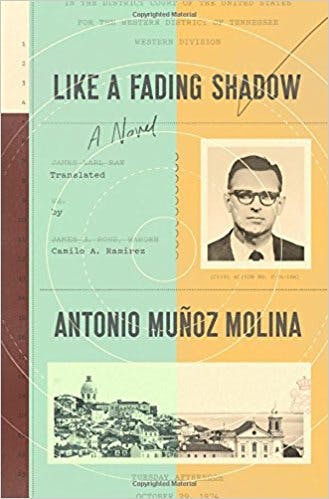Antonio Muñoz Molina is a writer at home in history, having fashioned novels out of the Spanish Civil War, the Holocaust, and the killing of a leader of the Spanish communist party. Like a Fading Shadow, the Spanish author’s latest novel to be translated into English, is a bold attempt at imagining his way into the mind and the life of James Earl Ray, the assassin who killed Martin Luther King Jr. in April 1968. Ray, who was already an escaped convict when he shot King, spent two months on the run afterward. Ray eventually traveled under a fake name to London and then onto Lisbon, where he spent 10 days trying to get passage on a ship to Africa. He hoped to become a mercenary in Angola, the Congo, or another colonial state where his white supremacist beliefs would be welcomed. Instead, he idled away his time before going back to London, where a typo in his passport led to him being recognized and arrested.

At times, the James Earl Ray of Like a Fading Shadow recalls the Lee Harvey Oswald of Don DeLillo’s novel Libra. Both men were at the mysterious heart of some of the most consequential assassinations of the twentieth century, and the stories of both remain mired in conspiracy. (Ray, who wrote two books while in prison, at first confessed and then later maintained his innocence until he died of cancer in 1998.) The obsessive reconstruction of events that attended the last years of their lives somehow leaves both Ray and Oswald as essentially unknowable. There seems to be an inherent tension between the kind of historical detail that Molina accumulates and the ability to understand a character’s motivations. I finished the book feeling that I had come to understand the author himself (or at least his fictionalized counterpart) far better than his subject.
Like a Fading Shadow is a peculiar novel that comes that comes freighted with a scaffolding of meta-commentary, authorial second-guessing, and boozy, romantic homilies to youthful excess and the artistic life. Ray’s story is only one of three strands that make up the novel, which ends up being as much about Molina’s artistic development as it is about the notorious assassin. The other sections look at Molina’s early years as a writer and conflicted family man and a period, later in his career, when he had a passionate affair with a woman he met while on book tour. It’s a book about its own creation that lays bare the mechanics of fiction, questioning whether they work at all while simultaneously arguing for the importance of fictionalizing history. “Being close to this place,” Molina writes of Lisbon, “and knowing that I can approach it, infuses wonder and reality in what was previously almost fiction.” For Molina, history sacralizes the novel, granting it a kind of integrity and real-world relevance that raises fiction to a higher plane—“almost fiction.”
Whether this technique charms readers may be another matter. “Even the most secret lives leave an indelible trace,” Molina writes of Ray. Yet it’s hard to say what the traces of Ray’s life add up to, what they mean beyond reflecting the behaviors and habits of an ugly soul. “Sometimes,” the author explains, “fiction wants to supplant reality, sometimes it settles for adding certain secondary details.” The secondary details here threaten to become the main event, and Molina risks exhausting readers with extensive reportage of what Ray ate, who he met, and where he went.
There’s almost nothing from Ray’s journey that seems to have escaped Molina’s notice during his archival research. Molina tells us as much, explaining that “it only takes a few seconds online to access the archives containing detailed accounts of almost everything he did, places he visited... even the names of women who slept with him or shared a drink at a bar.” The level of specificity is laughably precise, as when Molina learns “the brand of salted crackers left open and half-eaten in a rented room in a boardinghouse in Atlanta where his name never made it to the register because the owner was too drunk to ask for it.” Molina seems to be trying to prove a point here, something about what can be lost by emphasizing the facticity and evidentiary value of archival research. But these kinds of remarks don’t do much for readers who might be more interested in a scene of Ray at that Atlanta boardinghouse, with its sozzled proprietor, than a description of the author discovering this information.
In Molina’s theory of history, anything might be revealing. “No one is a mere passing silhouette, an extra, an auxiliary figure in the stories of others,” he argues. Every encounter must be named, described, plumbed for relevance. After all, “the more precise the topographical and temporal details, the more emphatic the beginning or end of the story will seem.” Molina plays with this rubric first by giving us one ending, which he calls “a possible ending if we look at this story under the austere clarity of facts.” But that’s only one potential outcome, and another ending shows Ray as a bit player in a larger conspiracy led by a shadowy man named Raoul. (In real life, after renouncing his confession, Ray claimed that someone named Raoul led a conspiracy to kill MLK—a belief that some members of the King family eventually supported.) The Raoul ending is very well done and it provides another resonance of DeLillo, with a sense of the sweep of history overwhelming Ray, who doesn’t understand the scale of what he’s signed up for.
“The flow of ordinary life weaves and unravels its arguments, its symmetries, its resonances,” Molina writes, “without anyone having to invent anything, just as the waves of the river draw themselves.” Life unspools in its own time, Molina seems to say, according to its own natural but inscrutable rhythms. “In a way, a novel also writes itself,” he adds. Like a Fading Shadow might be seen as a mongrel kind of auto-fiction (lately in style through writers like Karl Ove Knausgaard). Through frequent info-dumps and editorializing on the nature of the novel, Molina seems to be trying to construct a novel that writes itself, drawing on the raw materials of history and of the author’s own life.
Molina concludes that “literature is the desire to dwell inside the mind of another person, like an intruder in a house, to see the world through someone else’s eyes.” But there are times when the author better resembles a burglar who is cataloguing a house’s possessions, assessing each for its value, chucking aside those that are worthless and stuffing the rest into his satchel. The result is a strangely cobbled together novel that shows a deep attention to historical fidelity but not to narrative immersion. A highly decorated author, Molina has in the past proved himself to be a major novelist. But Like a Fading Shadow, with its compulsive regurgitation of facts and its awkward mix of memoir, history, and fiction, has a wayward feel to it, as if the author got lost in the thicket of his own investigation. For some, there’s pleasure to be found in these intellectual peregrinations. But others, when faced with the “austere clarity of facts,” will be left wanting more, namely a sense of invention.
